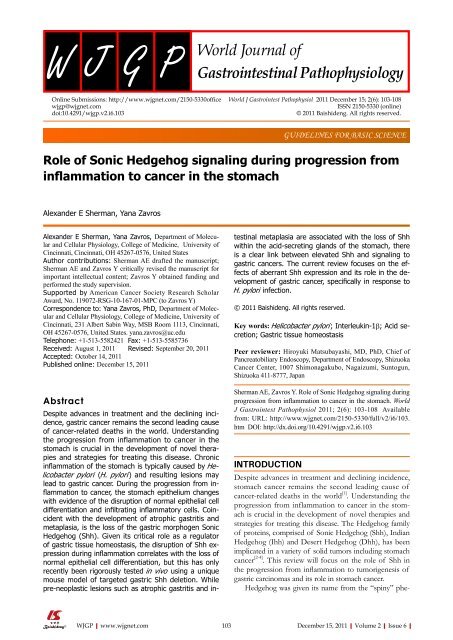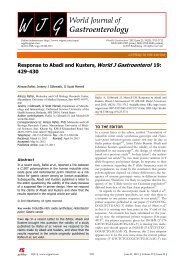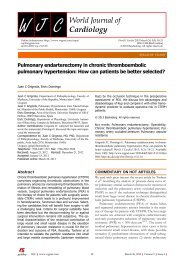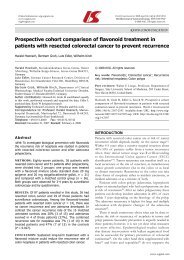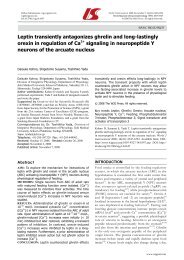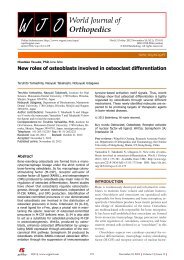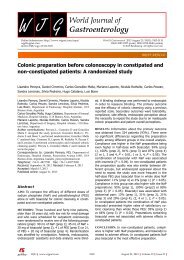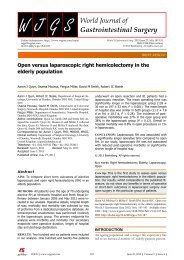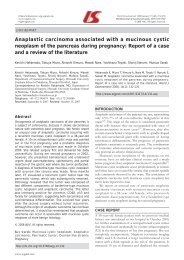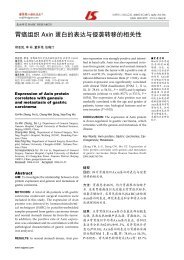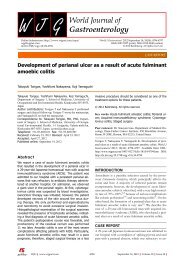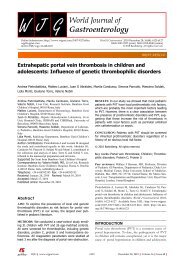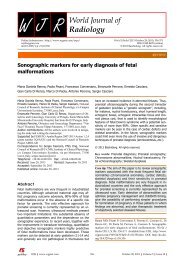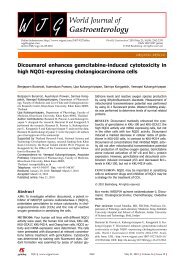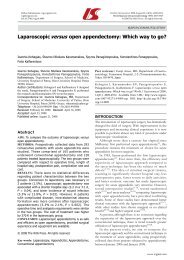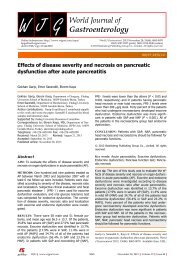World Journal of Gastrointestinal Pathophysiology
World Journal of Gastrointestinal Pathophysiology
World Journal of Gastrointestinal Pathophysiology
Create successful ePaper yourself
Turn your PDF publications into a flip-book with our unique Google optimized e-Paper software.
Online Submissions: http://www.wjgnet.com/2150-5330<strong>of</strong>fice<br />
wjgp@wjgnet.com<br />
doi:10.4291/wjgp.v2.i6.103<br />
<strong>World</strong> J Gastrointest Pathophysiol 2011 December 15; 2(6): 103-108<br />
ISSN 2150-5330 (online)<br />
© 2011 Baishideng. All rights reserved.<br />
Role <strong>of</strong> Sonic Hedgehog signaling during progression from<br />
inflammation to cancer in the stomach<br />
Alexander E Sherman, Yana Zavros<br />
Alexander E Sherman, Yana Zavros, Department <strong>of</strong> Molecular<br />
and Cellular Physiology, College <strong>of</strong> Medicine, University <strong>of</strong><br />
Cincinnati, Cincinnati, OH 45267-0576, United States<br />
Author contributions: Sherman AE drafted the manuscript;<br />
Sherman AE and Zavros Y critically revised the manuscript for<br />
important intellectual content; Zavros Y obtained funding and<br />
performed the study supervision.<br />
Supported by American Cancer Society Research Scholar<br />
Award, No. 119072-RSG-10-167-01-MPC (to Zavros Y)<br />
Correspondence to: Yana Zavros, PhD, Department <strong>of</strong> Molecular<br />
and Cellular Physiology, College <strong>of</strong> Medicine, University <strong>of</strong><br />
Cincinnati, 231 Albert Sabin Way, MSB Room 1113, Cincinnati,<br />
OH 45267-0576, United States. yana.zavros@uc.edu<br />
Telephone: +1-513-5582421 Fax: +1-513-5585736<br />
Received: August 1, 2011 Revised: September 20, 2011<br />
Accepted: October 14, 2011<br />
Published online: December 15, 2011<br />
Abstract<br />
Despite advances in treatment and the declining incidence,<br />
gastric cancer remains the second leading cause<br />
<strong>of</strong> cancer-related deaths in the world. Understanding<br />
the progression from inflammation to cancer in the<br />
stomach is crucial in the development <strong>of</strong> novel therapies<br />
and strategies for treating this disease. Chronic<br />
inflammation <strong>of</strong> the stomach is typically caused by Helicobacter<br />
pylori (H. pylori ) and resulting lesions may<br />
lead to gastric cancer. During the progression from inflammation<br />
to cancer, the stomach epithelium changes<br />
with evidence <strong>of</strong> the disruption <strong>of</strong> normal epithelial cell<br />
differentiation and infiltrating inflammatory cells. Coincident<br />
with the development <strong>of</strong> atrophic gastritis and<br />
metaplasia, is the loss <strong>of</strong> the gastric morphogen Sonic<br />
Hedgehog (Shh). Given its critical role as a regulator<br />
<strong>of</strong> gastric tissue homeostasis, the disruption <strong>of</strong> Shh expression<br />
during inflammation correlates with the loss <strong>of</strong><br />
normal epithelial cell differentiation, but this has only<br />
recently been rigorously tested in vivo using a unique<br />
mouse model <strong>of</strong> targeted gastric Shh deletion. While<br />
pre-neoplastic lesions such as atrophic gastritis and in-<br />
WJGP|www.wjgnet.com<br />
testinal metaplasia are associated with the loss <strong>of</strong> Shh<br />
within the acid-secreting glands <strong>of</strong> the stomach, there<br />
is a clear link between elevated Shh and signaling to<br />
gastric cancers. The current review focuses on the effects<br />
<strong>of</strong> aberrant Shh expression and its role in the development<br />
<strong>of</strong> gastric cancer, specifically in response to<br />
H. pylori infection.<br />
© 2011 Baishideng. All rights reserved.<br />
Key words: Helicobacter pylori ; Interleukin-1β; Acid secretion;<br />
Gastric tissue homeostasis<br />
Peer reviewer: Hiroyuki Matsubayashi, MD, PhD, Chief <strong>of</strong><br />
Pancreatobiliary Endoscopy, Department <strong>of</strong> Endoscopy, Shizuoka<br />
Cancer Center, 1007 Shimonagakubo, Nagaizumi, Suntogun,<br />
Shizuoka 411-8777, Japan<br />
Sherman AE, Zavros Y. Role <strong>of</strong> Sonic Hedgehog signaling during<br />
progression from inflammation to cancer in the stomach. <strong>World</strong><br />
J Gastrointest Pathophysiol 2011; 2(6): 103-108 Available<br />
from: URL: http://www.wjgnet.com/2150-5330/full/v2/i6/103.<br />
htm DOI: http://dx.doi.org/10.4291/wjgp.v2.i6.103<br />
INTRODUCTION<br />
GUIDELINES FOR BASIC SCIENCE<br />
Despite advances in treatment and declining incidence,<br />
stomach cancer remains the second leading cause <strong>of</strong><br />
cancer-related deaths in the world [1] . Understanding the<br />
progression from inflammation to cancer in the stomach<br />
is crucial in the development <strong>of</strong> novel therapies and<br />
strategies for treating this disease. The Hedgehog family<br />
<strong>of</strong> proteins, comprised <strong>of</strong> Sonic Hedgehog (Shh), Indian<br />
Hedgehog (Ihh) and Desert Hedgehog (Dhh), has been<br />
implicated in a variety <strong>of</strong> solid tumors including stomach<br />
cancer [2-4] . This review will focus on the role <strong>of</strong> Shh in<br />
the progression from inflammation to tumorigenesis <strong>of</strong><br />
gastric carcinomas and its role in stomach cancer.<br />
Hedgehog was given its name from the “spiny” phe-<br />
103 December 15, 2011|Volume 2|Issue 6|


